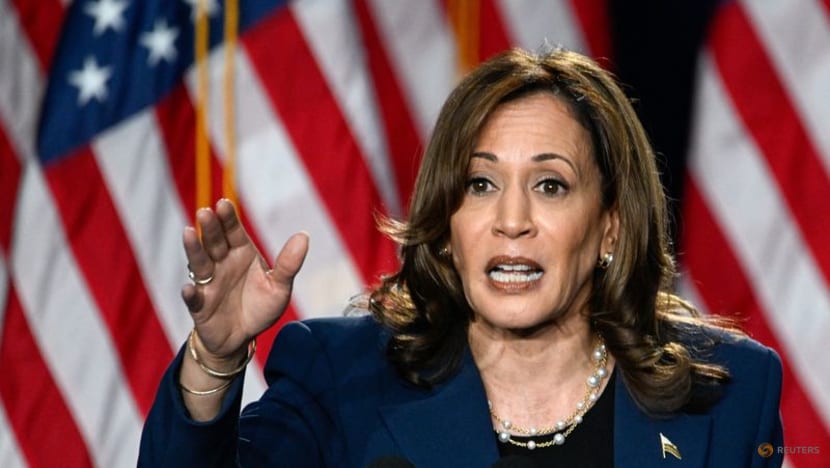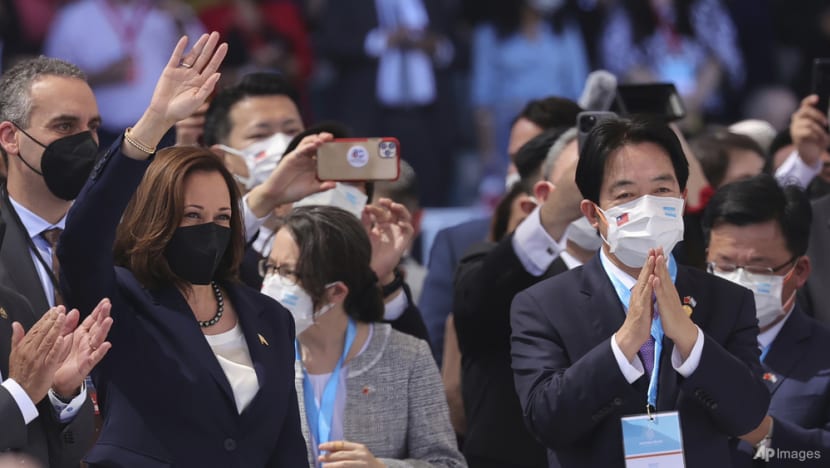Harris expected to continue Biden’s foreign policies in Asia if elected as US president: Analysts
Experts said Kamala Harris, who is the United States’ first female, Black and South Asian vice president, will also try to emphasise her connection to the region.

U.S. Vice President Kamala Harris delivers remarks during a campaign event at West Allis Central High School, in West Allis, Wisconsin, U.S., July 23, 2024. REUTERS/Vincent Alban

This audio is generated by an AI tool.
If United States Vice President Kamala Harris wins the presidential election in November, her administration will likely maintain America’s commitment to Asia and not rock the boat in terms of foreign policy, said analysts.
Harris, who is the country’s first female, Black and South Asian vice president, will also try to emphasise her connection to the region, they added.
“I think she will speak about being the first possible president of South Asian descent, and that she will understand what the aspirations and emerging hopes of the region are,” said Ngoei Wen-Qing, Associate Professor of History from Singapore Management University.
“The US will want to meet the region halfway, more than halfway, in fact, to counter any possible insecurities when it comes to other emerging threats within the region.”
Harris has been gaining support from Democratic heavyweights after President Joe Biden exited the presidential election race on Sunday (Jul 21), following calls from within the party for him to step down over age and mental fitness concerns.
She wrapped up the nomination on Monday by winning pledges from a majority of the delegates who at next month's party convention will determine the nominee.
If Harris officially becomes the Democrats’ candidate, the 59-year-old will go up against Republican candidate and former president Donald Trump, 78.
“PUSH TOWARDS CONTINUITY AND REASSURANCE”
In terms of how a Harris administration would look like for Asia, Ngoei told CNA’s Asia Now programme that the world is expecting “a lot of business as usual”, along with reassurances of continuity in US foreign policy towards Asia.
He noted how people in the region would be familiar with her after she made three visits to Asia, including Singapore and Vietnam, during her vice presidency.
“She has also made it clear that the countries of this region, the Indo Pacific, are likely to dictate the future of the world 10 to 30 years in the future,” he added.
“And as it is already, US foreign direct investment in places like Southeast Asia already amounts to more than what the US puts into China, Japan, South Korea, and India combined. So definitely, I think for Harris, a lot more push towards continuity and reassurance.”
Related:
OUTSPOKEN ON ASIAN HUMAN RIGHTS ISSUES
Sean King, senior vice president at New York consultancy firm Park Strategies, noted that Harris was “very outspoken” on Asian human rights issues during her time as California senator.
For example, she co-sponsored the Hong Kong Human Rights and Democracy Act with Florida senator Marco Rubio in 2019.
She also wrote several pieces of legislation on Myanmar, which has been embroiled in a civil war after its military junta staged a coup in 2021.
“As much as any president comes in with foreign policy experience (or) lack thereof, I feel very confident, given her background and given the administration she'd be leaving,” King told CNA938.
“I wouldn't have any qualms and I think a lot of allies feel very good about her.”
King added that he thinks Harris will push America’s alliances with its Asian allies as far as they can go in the countries themselves.
For instance, South Korea now has a pro-American president – Yoon Suk Yeol – who likely has three years left in office. But King said a scandal cannot be ruled out there.
He warned that Harris should not personalise things too much, though he said there has been no sign of that happening.
“If you had to think of something that I would not want her to see do that the last two presidents have done, that would be it, because I'm really not interested in how many times Biden's met (Chinese President) Xi Jinping,” King added.
“And I'm disgusted by the fact that Trump's in love with (North Korean leader) Kim Jong Un.”
DOES HARRIS POSE A THREAT TO CHINA?
King said he believes China is “a little worried” about Harris.
“She’s tough, she’s smart, and she would employ our allies against China and not just go along,” he added.
He noted that in 2022, Harris had “called out Beijing’s coercive behaviour in the Taiwan Strait”.
That same year during a visit to Honduras, she also “very conspicuously” greeted then-Taiwanese vice president Lai Ching-te, who was sworn in as Taiwan's new president earlier this year.

Following Biden’s exit from the race, Bloomberg reported that state-backed news outlets cast Harris as a weak vice president who would not pose a major threat to China if she assumed the Oval Office.
An online poll of 12,000 users on China’s Weibo platform found that nearly 80 per cent believed the Republicans would now prevail in the Nov 5 election.
“The fact that they’re talking about it means she does pose a threat to China. If she (doesn’t), then let sleeping dogs lie and just blow it off,” King said.
Ngoei said that a Harris administration will also want to reassure the Indo Pacific that they are staying in the region, especially given how China has been “trying to contest for some influence at the US’ expense in various countries”, said Ngoei.
Meanwhile, a Trump administration will likely bring about more unpredictability, he added.
A week ago, Trump said Taiwan should pay the US for protection from China. However, Ngoei pointed out that Taiwan “already pays for a tremendous amount of its defence” by purchasing US military equipment.
“That's what Trump says, versus those that portrayed themselves as his allies who suggest that there will be nothing to rock the boat. Things will be more or less like what Biden has been doing for the past couple of years,” Ngoei added.
“There are multiple voices signalling what their intentions are. With the Harris administration, if it comes to pass, that’s a little bit more predictable.”














